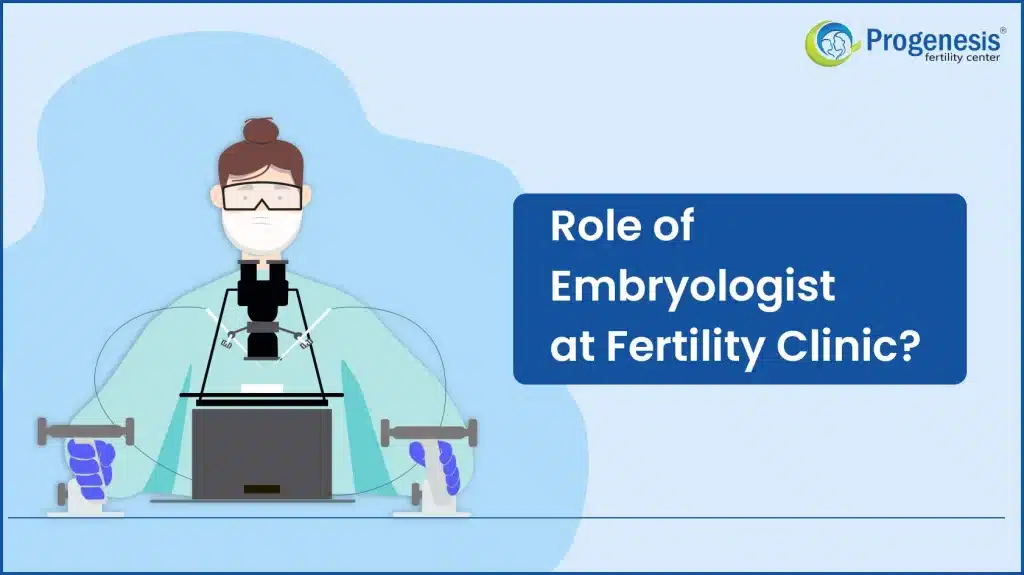What is the Role of an Embryologist?
An embryologist is not a doctor, but he or she possesses specialized skills that allow him or her to perform procedures with delicate cells such as sperm and eggs. They are in charge of the genetic materials (sperm and eggs) as they develop into embryos. An embryologist is essential throughout all stages of IVF treatment.
What degree is required to work as an embryologist?
According to the Assisted Reproductive Technique (Regulation) Bill 2020, embryologists in new ART facilities must hold a post-graduate degree in life sciences or a medical degree.
Suffering from infertility? Contact us today to know the best treatment options for you.
Free consultationEmbryologist takes care of the following
- Embryologists are critical in selecting a suitable donor and establishing the fitness of candidates for egg donation.
- They are in charge of cryopreservation of genetic material if the patients’ treatment objective is to store the eggs or embryos for future family building or donation.
- They are essential in freezing eggs, sperm, embryos, and ovarian tissue in such a way that ice does not hinder their development.
- When it comes time to thaw the eggs or embryos, they use cautious methods to assure that the components are in health.
- They additionally try to ensure that the embryology laboratory is a safe place for embryo development and storage.
We provide the best fertility treatment in Maharashtra. Contact us for more information.
Free consultationEmbryologist’s role in IVF
Every phase of the IVF procedure necessitates the presence of an embryologist.
| Step 1 | Egg extraction | Once the follicles have been recovered from the ovary, an embryologist checks the follicular fluid containing eggs from the follicles, picks the good quality eggs, and prepares them. |
| Step 2 | Collecting Sperm | A sperm sample from the male partner is obtained and given to the embryologist, who washes and separates the sperm, detects high-quality sperm, and prepares it for fertilization. |
| Step 3 | Choosing the embryo | Embryologists produce embryos, observe how they develop over a few days, and pick the best embryos for implantation. |
| Step 4 | Transferring the embryo | After choosing 1-2 high-quality embryos, they place them in an embryo transfer catheter, which the IVF specialist uses to implant the embryo in the woman’s uterus. |
Progenesis IVF centers, are known for their high success rates and impeccable treatments that they provide with the help of latest ART technology and experienced fertility specialists. Progenesis IVF have experienced embryologists who ensure that all fertility treatments are carried out using the best quality eggs and sperms to ensure a healthy and successful pregnancy
FAQs
How to become an embryologist?
Completing courses, such as a Master of Science in clinical embryology, can help you advance your profession and boost your earning potential. You can also seek a post-graduate diploma in clinical embryology. Most postgraduate and master’s degree programs last two years.
Is embryologist called a doctor?
An embryologist is not a doctor, but he or she possesses specialized skills that allow him or her to operate with delicate cells like sperm and eggs. An embryologist is essential at every stage of IVF treatment.
What does a fertility specialist do?
A fertility specialist is a medical expert who specializes in detecting and treating reproductive issues in order to assist people who have been trying to conceive but have been unsuccessful. Fertility specialists handle both male and female infertility issues.
When to see a fertility specialist?
If you’re under 35 and have been trying to conceive for more than a year, you should see a fertility specialist. You should also visit a fertility expert if you’re over 35 and have been trying to conceive for more than 6 months or you’ve had an ongoing series of miscarriages.

